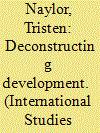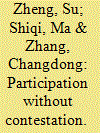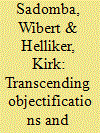| Srl | Item |
| 1 |
ID:
103308


|
|
|
|
|
| Publication |
2011.
|
| Summary/Abstract |
This study examines how power operates within international development discourse and investigates its effects on development organizations and on individuals-donors and recipients of aid alike. It analyzes the narratives pertaining to Afghanistan that are (re)produced by five different types of development actors: a donor state, a recipient state, an international financial institution, an international organization, and a non-governmental organization. I argue that the operation of multiple, interrelated types of power has both ideational and material effects which manifest in development policies, programs, and projects. I demonstrate how these types of power operate discursively through a Politics of Pity which (re)creates and perpetuates hierarchical, coconstituted relationships between and among these actors, and which (re)constitutes the identities and abilities of actors.
|
|
|
|
|
|
|
|
|
|
|
|
|
|
|
|
| 2 |
ID:
186947


|
|
|
|
|
| Summary/Abstract |
How do non-governmental organizations (NGOs) advocate public policies? What impacts their advocacy strategies? Although scholars have addressed these questions in a democratic context, less is known about NGO advocacy under powerful authoritarian regimes. Using China as a case study, we develop an institutional explanation of NGOs’ policy advocacy patterns and explore the impacts of NGO autonomy. Using a unique dataset of registered NGOs in three Chinese provinces, we find that NGOs with more autonomy tend to conduct direct negotiations with the government more actively (more political advocacy). However, these more autonomous NGOs are likely to be more hesitant to mobilize society from the bottom up (less social advocacy). These findings enrich our knowledge of social actors’ roles in the policymaking process in China.
|
|
|
|
|
|
|
|
|
|
|
|
|
|
|
|
| 3 |
ID:
096045


|
|
|
|
|
| Publication |
2010.
|
| Summary/Abstract |
In the academic literature, civil society is often conceptualized in terms of objectifications and subject-object dichotomies. This is the case with regard to both social movements and non-governmental organizations. This article seeks to transcend such argumentation by providing 'thick descriptions' of the agency of farm workers and civil society in the context of land reform in contemporary Zimbabwe. We examine a land-based social movement (and the role of farm workers within it) and the involvement of a particular non-governmental organization in farm worker livelihoods. On this basis, we offer a re-formulation of civil society as a social field marked by ambivalences and tensions.
|
|
|
|
|
|
|
|
|
|
|
|
|
|
|
|